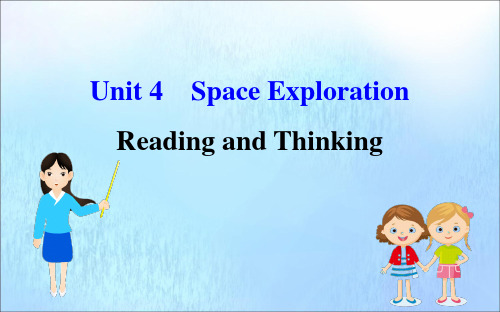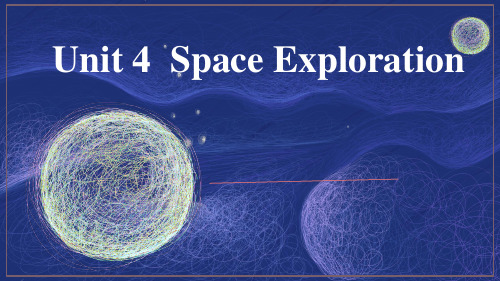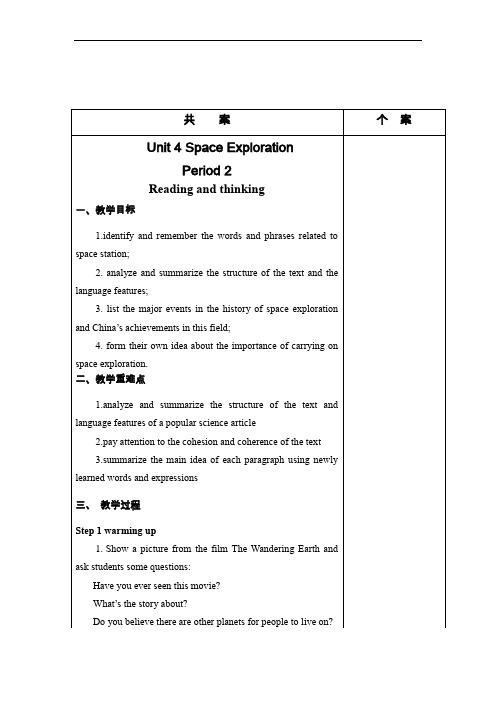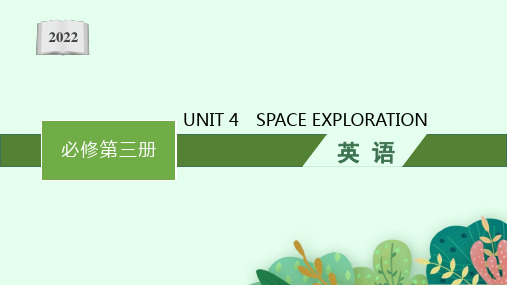2020年新人教版必修三《Unit 4 Space Exploration》单元教案全套(附导学案)2
2020学年新教材高中英语Unit4SpaceExplorationReadingandThinking课件新人教版必修第三册

Ⅰ. 文本整体理解: 理清文章架构
Ⅱ. 文本细节理解: 探寻语篇细节信息
1. Which satellite was launched by the USSR in 1957?
A. Shenzhou 5.
B. the Sputnik 1.
C. Voyager 1.
D. the USSR’s Soyuz 11.
Unit 4 Space Exploration Reading and Thinking
Ⅰ. 根据语境及汉语提示写出正确的单词 1. take _a_s_tr_o_n_a_u_t_ (宇航员) farther into space 2. the selection _p_r_o_ce_d_u__re_(步骤) 3. _m_e_n_t_a_l(精神的) and physical training 4. be _in_t_e_ll_i_g_en__t (聪明的)enough to get a college degree 5. escape Earth’s _g_r_a_v_it_y_(重力)
译文: _仰__望__星__空__, 人们总是希望更多地了解太空, _科__学__家__们__ _也__努__力__工__作__来__找__到__答__案__。
2. 根据课文完成短文 People have always wanted to learn more about
space. Before the mid-20th century, most people felt (1)_t_ra_v_e_l_li_n_g_ (travel) into space was an impossible dream. However, (2)_w_i_th_ the help of scientists, people succeeded in realizing their dream (3) _t_o_e_x_p_l_o_re_
人教版新教材高中英语必修第三册:Unit 4 Space Exploration

On the station, the ordinary becomes strange.The exercise bike for the American astronauts has no handlebars. It also has no seat. With no gravity,it's just as easy to pedal violently. You can watch a movie while you pedal by floating a microcomputer anywhere you want. But station residents have to be careful about staying in one place too long.Without gravity to help circulate air, the carbon dioxide you exhale(呼气)has a tendency to form an invisible(隐形的) cloud around your head.You can end up with what astronauts call a carbon-dioxide headache.
__th_e_y_e_x_e_rc_i_se__in__o_n_e_p_la_c_e_f_o_r_a_l_o_n_g_ti_m_e___________.
3.Some astronauts feel sick on the station during the first few days
because _t_h_e_ir_b_r_ai_n_s_r_e_ce_i_v_e_c_o_n_tr_a_d_ic_to_r_y_m__e_ss_a_g_e_s__________.
Unit4+Space+Exploraation+阅读说课课件

list and describe the four milestone 4 achievements in China’s space exploration;
identify the secret of China’s success on 5 aerospace and the features of China’s flying
Introduce four phases of China’s flying dream from the perspective of Timmy so as to string different texts together.
Scene setting
教材解读 Interpretation of the teaching material
THANK YOU
亮点特色
Highlights
selecting and integrating various teaching 1 materials to produce an effective outcome;
This lesson is dedicated to :
centering on one theme and creating an 2 interesting situation;
目标定位 Learning objectives
apply the key words and the infinitive “to 1 do” correctly in different activities and
express their ideas effectively;
By the end of the period, students
Unit 4 Space Exploration Discovering示范课教学课件英语人教必修三

Look at the following sentences. Focus on the italicized infinitives and identify their functions by changing the parts with infinitive into clauses.
Unit 4
激活已知
Activity 1: Revise and answer
What do you know about Yuri Gagarin?
On 12 April 1961, Yuri Gagarin became the first person in the world to go into space.
words modified by the infinitives
Part 3: Find out the infinitive’s logic subject and analyse the feature of its logic subject.
目的,原因,结果
in order/so as to 表目的too...to; only to; 表结果sb.+be+adj.+to; 表原因
Activity 5: Observe, analyse and summarise
Part 2: Fill in the table according to what you have analysed.
Restrictive attributive clause
Restrictive attributive clause
获取梳理
1. I trained for a long time to fly airplanes as a fighter pilot. 2. As we all know, an astronaut needs to be healthy and calm in order to work in space.3. First of all, you must be intelligent enough to get a related college degree.4. Some scientists were determined to help humans realise their dream to explore space.5. On 12 April 1961, Yuri Gagarin became the first person in the world to go into space.
Unit+4+Space+Exploration+Reading+and+Thinking+课件-

Para. 2
B. Earlier achievements of space exploration.
Para. 3
C. Bright future of space exploration.
Para. 4
D. The desire to explore the outer space.
Para. 5
Para. 5
Q10: What is the author’s attitude towards the future of space exploration? A: positive B: negative C: unclear D: indifferent
Task 3 More about the topic
Task 1:Read for a general idea
Q2:What is the main idea of each paragraph? Match
each paragraph with its main idea in your paper.
Para. 1
A. China's progress of space exploration.
Task 3 Read for details
curiosity
devotion
confidence
Q9:In your opinion, what helped China make such
greadtetperrmoingartioenss?
hardwork
cooperation
Task 2 Read for details
Thank you
Jul. 20, 1969 Sept. 5, 1977
Unit4阅读教案-2021-2022学年高中英语人教版(2019)必修第三册

making rockets that could escape Earth's gravity. Task 3 Read the text again, then complete the chart below.
Task 4
Put the following sentences in time order. A second manned orbit and Chinese spacewalk was completed. Astronauts observe and measure the far side of the moon. Tiangong 2 space lab was launched into space. Yang Liwei successfully orbited Earth.
scientists, people succeeded in realizing their dream (3) _________ (explore) space. On 4 October 1957, the Sputnik 1 satellite (4) ____________(launch) by the USSR. (5) ________________ scientists try to make sure nothing goes wrong, accidents can still happen. These disasters made everyone(6)____________(disappoint), but people still believe in the importance of (7) ________(carry) on space exploration. In 2003, China became the third country to (8)_____________ (independent) send humans into space. Then Shenzhou 6 and 7 completed (9)__ second manned orbit and the first Chinese spacewalk. In spite of the difficulties, scientists hope future (10)__________ (discovery) will not only enable us to understand the universe but also help us survive well into the future. Step 5 Discussion 1.What does the title “Space: The final frontier” mean to you? 2.What do you think are the main reasons for space exploration? Step 6 Homework Review the words and phrases in the passage
(新教材课件)必修第三册 UNIT4 SPACEEXPLORATION

UNIT 4 SPACE EXPLORATION
必修第三册
英语
内容索引
核心考点 课堂突破 随堂巩固 迁移运用
核心考点 课堂突破
1.determined adj.有决心的;意志坚定的 [教材原句] However,some scientists were determined to help humans realise their dream to explore space.(P40) 然而,一些科学家决意要帮助人类实现探 索太空的梦想。
4.carry on继续做,坚持干 [教材原句] This is because people believe in the importance of carrying on space exploration despite the huge risks.(P41) 这是因为人们坚信太空探索的 重要性,哪怕面临巨大的风险。
考点必记 (1)signal (to) sb to do sth示意某人做某事 signal (sb) that示意…… signal sth to sb向某人示意…… (2)traffic signals交通信号灯
[小情境写作] (4)看到那个漂亮的玩具,我有一种强烈的欲望进去玩一下它,但被商店的 橱窗阻挡了。 Seeing the beautiful toy,I had a strong desire to reach in and play with the toy,but was held back by the shop window.
语境巧练 [完成句子] (1)她打信号灯表示她要向左转弯。 She signalled that she was about to turn left. (2)我妈妈示意我将桌子移开。 My mother is signalling to me to remove the table. (3)当你过十字路口时,你应该注意交通信号灯。 When you come across the crossing,you should pay attention to the traffic signals.
人教英语必修三Unit4SpaceExploration微课教学+课件教案下载

↓Unit 4 单词朗读:Unit 4 课文朗读:重点单词:1. astronaut n.字航员;太空人2. procedure n.程序;步票;手续3. mental adj.精神的;思想的4.cm abbr. (centimetre or centimeter)厘米5.intelligent adj.有智慧的;聪明的;有智力的6. rocket n.火箭;火箭弹7. gravity n.重力;引力8.frontier n.边境;国界;边远地区8. vehicle n.交通工具;车辆10.universe n.宇宙;天地万物11.determined adj.有决心的;意志坚定的determine vt.查明;确定;决定12.satellite n.人造卫星;卫星13. launch vt.&n.发射;发起;上市14. orbit n. (环绕地球、太阳等运行的)轨道;势力范围v.&vi.沿轨道运行;环绕...运行15.giant adj,巨大的;伟大的n.巨人;巨兽;伟人16.leap n.跳跃;剧增;剧变(leapt, leaptor leaped, leaped)vi.&vt,跳过;跃过17.mankind n.人类18.agency n. (政府的) 专门机构;服务机构;代理处19. transmit vt.& vi.传输;发送20. data n. [pL.]资料;数据21. disappointed adj.失望的;沮丧的22. desire /n.渴望;欲望vt.渴望;期望23. carryon继续做,坚持干24. ongoing adj.持续存在的;仍在进行的;不断发展的25. on board在宇宙飞船上;在船上;在飞机上26. independently adj.独立地;自立地independent adj. 独立的;自立的27. spacecraft /speskr:ft/n.航天器;宇宙飞船28.spacewalk n.太空行走;太空行走的时间28. jade n.玉;翡翠;玉器30.dock vi. & vt. (两架航天器)对接; (使)...进港 n.码头;船坞31.signal vt. & vi.标志着;标明;发信号 n.信号;标志32.in the hope of doing sth抢着...的希望33. so as to (do sth)为了;以便34.recycle vt.回收利用;再利用34. muscle n.肌肉;实力;影响力35. lack n.缺乏;短缺vt. 没有;缺乏36. float vi.浮动;漂流;漂浮vt.使浮动;使漂流37.otherwise adv.否则;要不然37. beyond prep.在更远处;超出38. solar adj.太阳的;太阳能的solar system太阳系;类太阳系39. current adj.当前的;现在的n.水流;电流;思潮figure out弄懂;弄清楚;弄明白40.sufficient adj.足够的;充足的41. soap n.肥皂42. towel n.毛巾;抹布43. microwave n. ( also microwave oven )微波炉44. tissue n. 纸巾; ( 人、动植物细胞的)组织45. facility n.设施;设备46. keen adj.热衷的;渴望的47. globe n.地球;世界;地球仪48. argue vt. &vi.论证;争辩;争论argument n.争论;争吵;论点49. fatal adj.致命的;灾难性的50. shallow adj.肤浅的;浅的51. pattern n.模式;图案;模范52. analysis n. (pl. analyses ) (对事物的)分析;分析结果53. as a result所以;结果(是)54. high-end adj.高端的55. monitor n.监视器;监测仪 vt.监视;监测;监控56. regularly adv.经常;定期地regular adj.定期的;经常的;正常的57. foam n.泡沫橡胶;泡沫58. pillow n.枕头59. smartphone n.智能手机60. resource n.资源;财力:物力61. limited adj.有限的62. provide for sb提供生活所需63. closing adj.结尾的;结束的 n.停业;关闭:倒闭in closing最后64. mystery n.神秘事物;谜65. run out用完;耗尽66. attach vt.系;绑;贴66. oxygen n.氧;氧气67. Sputnik 1 “旅伴一号”(苏联发射的人类第一颗人造卫星)68. the USSR abbr. the Union of Soviet Socialist Republics苏联69. Yuri Gagarin 尤里.加加林(苏联宇航员)70. Neil Armstrong 尼尔●阿姆斯特朗( 美国宇航员)71. NASA abbr. National Aeronautics and Spac eAdministration (美国)国家航空与航天局72. Voyager 1“旅行者一号”73. Soyuz 11“联盟11号”74. Challenger “挑战者”国际空间站号航天飞机75. the International Space Station JadeRabbit“玉兔”月球车76. Mars 火星77. Jupiter n.木星78. Typhoon Goni台风天鹅79. GPS abbr. global positioning system 全球(卫星)定位系统重点句型:英汉对照SPACE: THE FINAL FRONTIER太空:最后的边境“Are we alone? What\\'s out there?” Looking up at the stars, people have always wanted to learn more about space, and scientists work hard to find answers. They make vehicles to carry brave people into space to find out the secrets of the universe. They also really wish to discover other planets that are suitable enough to support life.“我们是否孤独?太空以外是什么?” 仰望星空,人们一直想更多地了解太空,科学家们也在努力寻找答案。
- 1、下载文档前请自行甄别文档内容的完整性,平台不提供额外的编辑、内容补充、找答案等附加服务。
- 2、"仅部分预览"的文档,不可在线预览部分如存在完整性等问题,可反馈申请退款(可完整预览的文档不适用该条件!)。
- 3、如文档侵犯您的权益,请联系客服反馈,我们会尽快为您处理(人工客服工作时间:9:00-18:30)。
Unit 4 Space ExplorationListening and Speaking & Listening and TalkingTeaching Aims1. Students can get detailed information about how Yang Liwei became an astronaut and Max’s space life.2. Students learn to proper listening strategy to get detailed information—listening for numbers and taking notes.3. Students can learn related sentences or phrases to express their curiosity like “I wish to know...” “I’d love to know...”4. Students can learn more about the space and astronauts, even be interested in working hard to be an astronaut.Important Points and Difficult Points1. Students can get detailed information about how Yang Liwei became an astronaut and Max’s space life.2. Students learn to proper listening strategy to get detailed information—listening for numbers and taking notes.3. Students can learn related sentences or phrases to express their curiosity like “I wish to know...” “I’d love to know...”Teaching ProceduresPart A Listening and Speaking—Talk about how to become an astronautStep 1 Lead in—Small talkLook at the picture on Page 38 and tell your classmates what you can see. Get some students to talk about it.Step 2 Before-listening1. As for the space exploration, what do you think about?Answers: space, shuttle, astronaut, spaceship, rocket, space suit, solar system...2. Can you name any famous astronauts from China or abroad? Have Ss name some.3. Do you know anything about the selection procedure for astronauts? Make a list of the possible requirements.Step 3 While-listening—Task 1Listen to the interview and tick the correct statements in Activity 2.Then check the answers in class.Step 4 While-listening—Task 2Listen again and fill in the blanks with the correct numbers in Activity 3.Before listening, go through “Listen for numbers”. Then get some Ss to check their answers.Step 5 While-listening—Task 3Listen to the interview again and make a list of the requirements for becoming an astronaut.●Education background: college degree●Experience: rich experience of fighter●Health condition: perfect physical and mental health and body shape; properheight and weight●Courses: English, science and astronomy●Special training: using space equipment; physical and mental trainingStep 6 Post-listening—SpeakingWork in pairs. Discuss whether you would like to be an astronaut in the future and give your reasons. Use what you have learnt from the interview to help you.Go through the example first then practice with your partners.Then Get some pairs to share the dialogues.Step 7 Pronunciation1. Read the poem. Mark the stressed syllables with O and unstressed syllables with o.2. Then try reading the poem to each other with rhythm. Then get some Ss to read the poem.3. Listen and repeat after the recording. Check whether Ss’ mark-ups are correct.Part B Listening and Talking—Talk about life in spaceStep 1 Before-listeningBefore you listen, look at the pictures in Activity 1 and guess whether they would be useful for astronauts in space. Have Ss discuss and share.Step 2 While-listeningMax is interviewing Captain Brown about his life in space. Listen to the interview and answer the questions.1. What did Captain Brown usually wear inside the station?2. How did he prepare his food in space?3. How did he keep himself clean in space?4. How did he spend most of his time in space?5. What did he do during his free time?6. What did he look forward to most during his stay in space?Then check the answers with the class.Step 3 TalkingWork in groups. Imagine you are going to a space camp and Captain Brown has been invited to give a talk. Discus the questions you would like to ask him and then make a list. Go through the example dialogue first.Expressing curiosity●I’d love to know...●I wonder how/what/why/...●Well, I’d really like to find out...●I’d particularly like to know...●I’m most curious about...●I’m most interested to discover...●I’m very keen to know... ●I wish to know...●I hope you won’t mind me asking about...Step 4 HomeworkFinish the exercises in Workbook.Unit 4 Space ExplorationReading and Thinking【教学目标】1. Read quickly to get detailed information according the timeline; read carefully to summarize the main idea.2. Learn the reading skills—finding the timeline and summarizing the main idea by finding the words or ideas.3. Have a passion for our country and be proud of the space exploration.4. Learn to think critically about the space exploration.【教学重难点】1. Read quickly to get detailed information according the timeline; read carefully to summarize the main idea.2. Learn the reading skills—finding the timeline and summarizing the main idea by finding the words or ideas.【教学过程】Step 1 Lead in —Small talkWatch a video about Space experiment and discuss what you have learnt from it. Step 2 Before reading —Predict the contentSpace: the final frontierChinese meaning: 太空:最后的边境Frontier: the border, which might mean the human’s recognition edge or exploration edge.From the title and the pictures and the title, we can know that the article might be about the development of space exploration. It broadens us human’s recognition edge or exploration edge. So it is an exposition.Step 3 While reading —Task 11. Read the text. Several sentences have been removed from it. Choose the correct sentences A —D to fill each gap in the text.A. Although scientists try to make sure nothing goes wrong, accidents can still happen.B. They also really wish to discover other planets that are suitable enough to support life.C. The future of space exploration remains bright.D. After many experiments, they succeeded in making rockets that could escape Earth’s gravity.Answers: BDAC2. Scan the text and match the main idea.Para 1 A.China has made great progress in exploring space.Para 2 B.The future of space exploration remains bright.Para 3 C.The achievements that the USSR and America made.Para 4 D.People have always wanted to explore space.Para 5 E.The desire of people to explore the universe never died.Answers: DCEAB3. The main idea of the passage is the space exploration of humankind.Step 4 While reading—Task 2Read the text and fill in the tableStep 5 While reading—Task 3Read the text again and answer the following questions. Then have Ss share their answers.Q1: Who was the first person in the world to go into the space?Q2: Who was the first man to orbit Earth in Shenzhou 5 spacecraft?Q3: In which satellites all the astronauts died during their missions?Q4: What is the function of the International exploration?Q5: What can you learn from Para 4?Q6: What is the attitude to the space exploration?Step 6 Post reading1. RetellHave some Ss try to retell the text.2. Critical thinkingQ1: What do you think of the space exploration?I think it is beneficial to us. Through further study of space, people will make full use of it in the future, such as the space experiments by Wang Yaping in Tian Gong 1.Q2: If you are determined to be an astronaut, what should you prepare at present?First of all, I should study hard to get a related college degree. Besides, I must keep mental and physical healthy.Step 7. HomeworkTry to summarize the structure of the article by a mind map.Unit 4 Space ExplorationDiscovering Useful Structures【教学目标】1. Learn the structure, functions and features of infinitives.2. Learn to summarize some rules about infinitives to show purpose and modify.3. Learn to use infinitives in oral and writing English.【教学重难点】1. Learn to summarize some rules about infinitives to show purpose and modify.2. Learn to use infinitives in oral and writing English.【教学过程】Step 1 Lead in—Pair workLook at the following sentences and focus on the italicized infinitives. In pairs, discuss their functions.1. I trained for a long time to fly airplanes as a fighter pilot.(作目的状语)2. As we all know, an astronaut needs to be healthy and calm in order to work in space.(作目的状语)3. First of all, you must be intelligent enough to get a related college degree.(作目的状语)4. Some scientist were determined to help humans realize their dream to explore space.(作定语)5. On 12 April 1961, Yuri Gagarin became the first person in the world to go into space.(作定语)Summary:1.不定式的结构:to+do原形。
